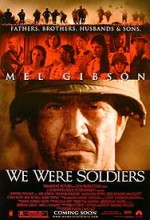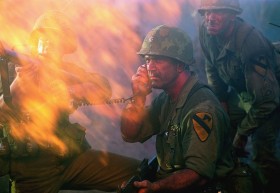|
We Were Soldiers
|
| |
 |
USA, 2002. Rated R. 138 minutes.
Cast:
Mel Gibson, Madeleine Stowe, Sam Elliot, Greg Kinnear, Chris Klein, Barry
Pepper, Josh Daugherty, Keri Russell, Edwin Morrow, Mike White, Jsu Garcia,
Mark McCracken, Don Duong
Writers: Randall Wallace, based on the book We Were Soldiers
Once…And Young, by Joseph L. Galloway and Hal Moore
Music: Nick Glennie-Smith
Cinematographer: Dean Semler
Producers: Bruce Davey, Stephen McEveety, Randall Wallace
Director: Randall Wallace
LINKS
|
 here
is little one can say to recommend We Were Soldiers, except that it is
a competent, passably entertaining war movie. Let's acknowledge that up front
and get it out of the way, because--be warned--the rest of this review will
excoriate the movie.
here
is little one can say to recommend We Were Soldiers, except that it is
a competent, passably entertaining war movie. Let's acknowledge that up front
and get it out of the way, because--be warned--the rest of this review will
excoriate the movie.
The film's lack of noteworthiness is itself noteworthy. We are talking about
a reteaming of Best Picture architects Mel Gibson and Randall Wallace, auteurs
of that masterpiece of melodrama, Braveheart, which did not deserve its
awards but was a lot better than its naysayers maintain. This time screenwriter
Wallace handles the directing chores instead of Gibson. On the other hand, let's
not forget that Wallace followed Braveheart with The Man in the Iron
Mask and Pearl Harbor, two of
the most disastrous screenplays to receive the big-budget treatment in the past
five years.
According to the history books, on the morning of Sunday, November 14, 1965,
approximately 400 young soldiers led by Lieutenant Colonel Hal Moore (Gibson)
were transported via helicopter to Landing Zone "X-Ray" in the Ia Drang Valley,
known also as "The Valley of Death," deep in the interior of South Vietnam.
There Moore and his men found themselves surrounded and outnumbered five to
one by the North Vietnamese. The savage battle that ensued over the following
48 hours was the first major encounter between the armies of North Vietnam and
the United States.
The battle also marked the first systematic use of helicopters for battle purposes,
under fire. Helicopters became known as the new cavalry, and in fact, Moore's
unit is called the First Battalion of the Seventh Cavalry. The idea that his
unit is the same as that of General Custer gets a lot of play. To emphasize
the possible parallels between Moore and Custer, Wallace opens the film with
a massacre of French soldiers at the hands of the Vietnamese in 1954. Later
in the film, Moore contemplates his mission by staying up late at night studying
reports about the French massacre and stories about Little Big Horn. Custer
comes up again during the battle, when Moore wonders what went through Custer's
head when he first realized he had led his men into a slaughter.
Moore and his men are in a desperate situation, surrounded and outnumbered
deep in the enemy's homeland, like Custer. Custer's enemies, however, outnumbered
his troops 10 to 1, twice that facing Moore's men. More importantly, Custer
did not have the benefit of air and heavy-artillery support from several miles
away, or doubtless he would have lived to tell tall tales about his heroism.
At least half the enemy casualties in We Were Soldiers are caused by
artillery shells and horrific firebombing. That makes the odds almost even,
despite what Wallace keeps telling us.
Be that as it may, the heroism of Moore and his soldiers is real, as is the
heroism of the North Vietnamese. Unfortunately, the heroism never takes flight
because of lackluster pacing and gag-me cornball dialogue. We Were Soldiers
is a by-the-numbers script. Prologue: Show how it all started. Act One: Introduce
the characters, show the training, and establish the home front, including all
the wives and children. Act Two: The soldiers head into battle. Etc. After the
initial casualties, the film predictably cuts to a predictable sequence of the
wives getting the news back home and being predictably upset. Don't misunderstand--I
don't mean to take these tragedies lightly; it's just the movie fails to make
these powerful human experiences seem like anything other than tired war-film
clichés.
Along with the trite dialogue, we get the stock characters:… the be-haloed
wives (Madeline Stowe and Keri Russell, among others); the acid-tongued, crotchety
sergeant major (scene-stealing Sam Elliot); the reluctantly heroic helicopter
pilot (Greg Kinnear); the naïve, fresh-faced young officer (Chris Klein) who--wouldn't
you know it--is also a brand-new father; and the valiant enemy commander with
a gift for philosophy (Don Duong), who is cut from the exact same cloth as Admiral
Yamamoto in Wallace's Pearl Harbor.
What's the message here? That these men have been underappreciated? That they,
like the men in Black Hawk Down,
fought for each other? It's interesting how we, as a country, send men 10,000
miles away so they can fight for each other. If that's the argument being made,
then all the fighting and killing becomes even more pointless, undercutting
efforts to assign the soldiers' heroism Greater Meaning. Finding meaning in
meaninglessness can be done, but it requires filmmakers with far greater subtlety
than Randall Wallace possesses.
Everyone is heroic in We Were Soldiers, despite that Vietnam is remembered
as the most misguided war we've ever fought. However, Moore and war photojournalist
Joe Galloway (Barry Pepper in the movie), who wrote the book on which the film
is based, believe that U.S. soldiers have been unfairly victimized by the anti-war
sentiments of many Americans. These men went to Vietnam because they were sent
there, and in the fighting sacrificed their lives and drew on reserves of heroism
they didn't know they had. There are no bad people, Moore, Galloway, and Wallace
are saying, just bad situations. They want to show us the war from the soldiers'
perspective, and Wallace seems to fear that any kind of macro-level perspective
on the how-and-why of the war would be distracting.
Fair enough. If these are the driving ideas, however, the film's failure to
tell us much about how and why these men were, in fact, caught up in a bad situation
(beyond being sent into an obvious ambush) is a major lapse. We don't even know
whether the soldiers are draftees or volunteers--the former would lend far more
weight to the filmmakers' argument. (As it turns out, they were a mix of draftees,
veterans, and officers newly graduated from West Point.) Moreover, what's the
point of the French history lesson in the prologue, which has nothing to do
with the soldiers' perspective? Oh right, to set up the Custer analogy.
Like Black Hawk Down, We Were Soldiers is concerned more with the "what"
than the "why." Anytime you approach your subject matter from that angle and
then fill your film with clichés, you risk ending up with a film that's mechanical
and uninspired. We Were Soldiers is a little better than that, thanks
in part to the actors and the production values, but not enough to distinguish
itself from the many other movies made on the subject. Were this one of the
first movies made about the Vietnam War, We Were Soldiers would have
more to offer an audience, but it's not. We can only hope it is the last war
movie--about Vietnam or any other conflict--that is so trite.
Review
© March 2002 by AboutFilm.Com and the author.
Images © 2002 Paramount Pictures. All Rights Reserved.


